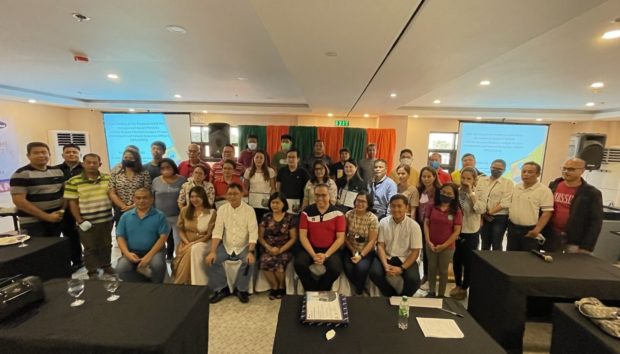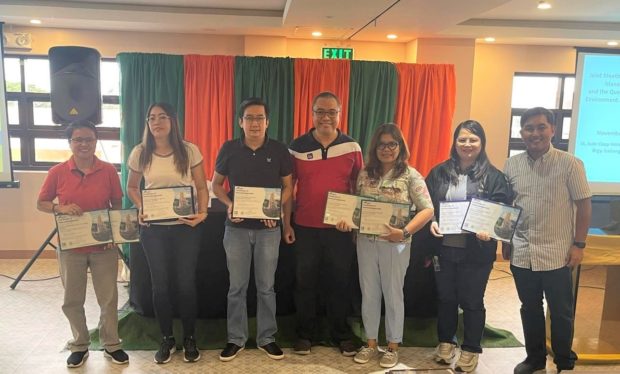CEMEX recognizes solid waste management partners in Quezon Province
CEMEX Philippines recently recognized its various local government partners in the Province of Quezon for demonstrating a clear commitment to support climate action through proper solid waste management initiatives.
The City of Tayabas and the towns of Atimonan, Candelaria, Mauban, Mulanay and Tiaong received special recognition from CEMEX Philippines, in acknowledgment of their residual plastic wastes footprint reduction through co-processing. The awarding was held during the meeting of the Quezon Province Solid Waste Management Board and the Province’s League of Local Environment and Natural Resources Officers in Tayabas City, Quezon.

Representatives from partner LGUs in Quezon Province during the recognition by CEMEX Philippines of their plastic waste footprint reduction efforts. Six (6) LGUs in the province have existing MOUs with CEMEX Philippines for the co-processing of their municipal residual wastes with the goal of achieving plastic neutrality and mitigate the impact of climate change. CEMEX is a global construction materials company that is building a better future through sustainable products and solutions. CEMEX is committed to achieving carbon neutrality through relentless innovation and industry-leading research and development. At the forefront of the circular economy in the construction value chain, CEMEX is pioneering ways to increase the use of waste and residues as alternative raw materials and fuels in its operations through the use of new technologies. CEMEX offers cement, ready-mix concrete, aggregates and urbanization solutions in growing markets around the world, powered by a multinational workforce focused on providing superior customer experience enabled by digital technologies. For more information, please visit: www.cemexholdingsphilippines.com.
The six localities in Quezon have been helping CEMEX Philippines address the country’s waste management problem through proper waste segregation, collection, treatment and co-processing. Since 2021, more than 360,000 kgs of residual waste have been collected from the Province, and CEMEX expects to gather more with additional potential partner LGUs in the Province.
CEMEX Philippines continues to strengthen multisectoral partnerships and aims to add more to the growing list of LGUs in the achievement of plastic neutrality, carbon footprint reduction and contribute to a more circular economy.
“We have been a partner of CEMEX for almost three years already and CEMEX has been a big help to our municipality as it brought us a lot of savings in our solid waste management,” shares Joelda Tadeja, Municipal Environment Officer of Mulanay, Quezon and President of Quezon Province’s League of Local Environment and Natural Resources Officers.
Through a memorandum of understanding, CEMEX and these cities and municipalities in the Province of Quezon are working together towards proper segregation, collection of qualified residual plastic wastes generated from their respective areas, which are transported to CEMEX’s Solid Cement Plant in Antipolo City for treatment and co-processing. Supported by the Department of Environment and Natural Resources (DENR), co-processing is a proven sustainable way of disposing plastic waste by diverting and utilizing them during the cement manufacturing process.

Held at Tayabas City, Quezon, representatives from partner LGUs in the province receive their certificate of recognition from CEMEX Philippines for their plastic waste footprint reduction efforts achieved through co-processing partnership with CEMEX, which is hereby represented by ERM, CC&PA Director Atty. Christer Gaudiano (center) and Alternative Fuels Manager Rowell Penaflor (right-most).
“Ever since we had a partnership with CEMEX, segregation has been really implemented and the diversion of our residual plastic wastes allowed us to extend the life of our sanitary landfill. Because of our partnership, a lot of people were encouraged to segregate and our LGU implemented more programs about waste management,” says Ryan B. De Luna, Municipal Environment Officer of Candelaria, Quezon.
The Philippines is one of the largest plastic waste contributors in the world. A 2021 World Bank study estimates that over 163 million pieces of sachets are consumed every day and 2.7 million tons of plastic waste are generated in the Philippines each year, around 20 percent of which ends up in the ocean.
“Indeed, plastic waste management is one of our biggest challenges in the country, and we must act together to address this problem” says Atty. Christer Gaudiano, Director for ERM, Corporate Communications & Public Affairs at CEMEX Philippines.
“We are proud with our long and steady partnerships in Quezon Province, and we are happy that we are able to support various local governments in the country to address plastic waste management. Through innovative means, we can divert residual plastic wastes and integrate them into our cement manufacturing operations as alternative energy sources,” Atty. Gaudiano adds.
To date, a total of 25 LGUs are already co-processing their residual wastes with CEMEX, and over two dozen partners are in the pipeline as more LGUs realize the benefits of co-processing and how it helps them regulate and manage waste in their respective cities or municipalities.
These sustainability efforts are all aligned with CEMEX’s Future in Action agenda, the company’s global strategy to help mitigate the impact of climate change by reducing CO2 emissions by 35% by 2025 and by more than 40% by 2030, with the ultimate goal of becoming a net-zero CO2 company by 2050.
ADVT.